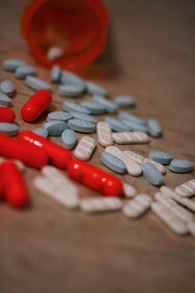Childrens Rights
August 1, 2011 / Posted by cr
After suffering abuse and neglect, plenty of America’s foster children need therapy and medical assistance, but across the nation it’s become too easy to throw mind-altering pills at their problems and hope they go away.

[Part 1 of 3]
Two years ago, a South Florida doctor prescribed a dangerous antidepressant called Symbyax to a young boy who had already taken other psychotropic medications to treat his depression and attention deficit hyperactivity disorder. Symbyax had a documented risk of inducing suicidal thoughts in young patients.
After one month on the drug, in an incident as shocking today as it was when it happened, Gabriel Myers ended his life.
He was all of seven years old when he hung himself in the bathroom of his foster home.
In the 1980s, “Just Say No” permeated the national consciousness as the mantra of an anti-drug crusade aimed at America’s youth. But today, doctors are pushing different kinds of drugs upon children — and no group of kids is more likely to be prescribed psychotropic medications than those in foster care.
Drugs properly administered and thoughtfully prescribed as part of an appropriate, overall treatment program — that includes long-term planning for the child — can certainly be helpful to a troubled kid. But given the soaring rates of psychotropic drug use among children in foster care, these medications seem to be taking the role of an easy crutch in medical care, and the results can be tragic.
A multistate study published in 2010 found that psychotropic drug use among children in foster care more than doubled over the previous decade. Equally troubling was the evidence that these children are anywhere from four to 12 times more likely to be prescribed psychotropic drugs than the general youth population.
Children’s Rights has known about huge surge in the use of psychotropics long before this report came out. Rampant and reckless medication of children is simply another form of abuse, and it’s got to stop.
We’ve been documenting the prevalence of these drugs for years. Four of the nine Oklahoma children in whose names we launched our campaign for reform were, at one time or another during their stay in foster care, prescribed multiple psychotropics. Two of the children named as plaintiffs in Massachusetts were forced to endure the same treatment. And in our recently launched campaign in Texas to protect the 12,000 kids shifted into a kind of permanent foster care, all nine of our child plaintiffs have a history of taking a combination of powerful psychotropics.
What exactly are psychotropic drugs? They chemically alter brain function and change mood, cognition, and behavior. Perhaps best known as antidepressants and antipsychotics, they’re used for a variety of mental health issues including depression, schizophrenia, attention deficit hyperactivity disorder, and many other behavioral issues.
The side effects of these medications can be devastating. Here are a few of the most commonly prescribed drugs:
Risperdal — antidepressant — can cause breast growth in young boys, trigger weight gain, and sadness and anxiety.
Seroquel — antipsychotic — can cause agitation and hostility.
Trazodone — generic antidepressant — can cause psychomotor retardation, confusion, and memory loss.
And the National Institute of Health identifies both Seroquel and Trazodone as “mood elevators” with the potential to induce suicidal thoughts in young children.
These drugs pose even greater risk when mixed — as so often they are — with other medications. Adding to the danger is the reality that kids in foster care for long periods of time — shuttling from one placement to another — rarely get consistent medical attention. An ever-changing roster of doctors and therapists tends to produce a dizzying medication history.
This is an enormous problem for American foster care — but it’s finally starting to get well-deserved attention. PBS recently broadcast a powerful video that included shocking photos of a boy crippled by multiple medications and how he transformed once his adoptive family weaned him off the drugs.
Alarmed by the rising usage trends, the federal General Accountability Office (GAO) has undertaken a study of its own to investigate excessive usage of psychotropic drugs in foster care. We will be taking a close look at the GAO’s findings so we can keep you informed about this disturbing problem.
The roadmaps for sweeping foster care reform that we negotiated in New Jersey, Michigan, and Tennessee prohibit child welfare officials from using psychotropics as a method of discipline or control for any child. We’ve also ensured that these states are required by force of law to hire medical directors — a position that didn’t previously exist — to monitor usage.
Drugs have been a youth problem for decades. But only recently has the threat’s source spread beyond street dealers to doctors and child welfare officials. Children’s Rights will continue to be vigilant in pressuring states to make psychotropics a last resort — and not a quick fix to a kid’s problems.
READ PART 2: A Merry-Go-Round of Psychotropic Drugs Can Destroy a Childhood
READ PART 3: Freed from a Pharmaceutical Fog, A Young Man’s Life Changes






Zyprexa,Risperdal and Seroquel health risk.
Weight gain, increases in triglyceride levels and associated risks for diabetes and cardiovascular disease.
The average weight gain (adults) over the 12 week study period was the highest for Zyprexa—17 pounds.
One in 145 adults died in clinical trials of those taking the antipsychotic drugs Zyprexa. This is Lilly's # 1 product over $ 4 billion year sales,moreover Eli Lilly also make billions on drugs that treat the diabetes often that has *been caused* by the Zyprexa!
---
Daniel Haszard Zyprexa victim activist and patient who got diabetes from it.
I have linked to your article on my site because it is such a great example of the harmful collusion of psychiatrist, pharmaceutical companies, and governments.
James Pricer
http://ThePschReport.com